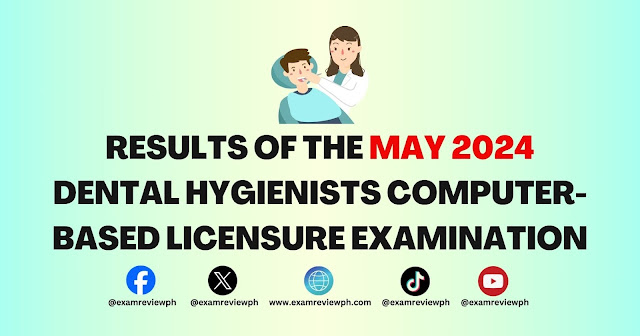17 Out of 41 Candidates Successfully Pass
The Professional Regulation Commission (PRC) has officially announced the results of the Dental Hygienists Computer-Based Licensure Examination, which was administered by the Board of Dentistry in the National Capital Region (NCR) last May 2024. Out of 41 candidates who took the exam, 17 have successfully passed.
Board of Dentistry Members
The examination was conducted under the supervision of the esteemed members of the Board of Dentistry, who are:
- Dr. Merlin A. Go, Officer-In-Charge
- Dr. Melinda L. Garcia
- Dr. Rodolfo R. Drapete
- Dr. Carlito D. Paragas
- Dr. Gloria M. Bumanlag
Swift Release of Results
In a testament to the efficiency and dedication of the PRC, the results were released in just one (1) working day following the final day of the examination. This rapid turnaround highlights the Commission's commitment to providing timely information to examinees.
Registration Instructions for Successful Examinees
Starting August 5, 2024, successful candidates can begin the registration process for the issuance of their Professional Identification Card (ID) and Certificate of Registration. The registration will be conducted online. To register, candidates should visit the PRC's official website at www.prc.gov.ph and follow the provided instructions for initial registration.
Requirements for Registration
Candidates are required to bring the following items for the registration process:
- Downloaded and duly accomplished Oath Form or Panunumpa ng Propesyonal
- Notice of admission (for identification purposes)
- Two (2) passport-sized pictures (colored with white background and complete name tag)
- Two (2) sets of documentary stamps
- One (1) short brown envelope
It is mandatory for successful examinees to personally register and sign in the Roster of Registered Professionals.
Our team congratulates the new dental hygienists on their success and wishes them a prosperous career in their chosen field. This achievement marks a significant milestone in their professional journey, and the Commission is proud to support the growth and development of these new professionals in the healthcare industry.
PERFORMANCE OF SCHOOLS
The performance of schools in the May 2024 Dental Hygienists Computer-Based Licensure Examination in alphabetical order as per R.A. 8981 otherwise known as PRC Modernization Act of 2000 Section 7(m) "To monitor the performance of schools in licensure examinations and publish the results thereof in a newspaper of national circulation" is as follows:
Any discrepancy in the report is not intentional on the part of the Commission, but rather due to miscoding of school codes by the examinees themselves. Concerned schools may write the Commission for correction.
Complete List of Passers in the May 2024 Dental Hygienists Computer-Based Licensure Examination
SOURCE:
PRC Philippines



